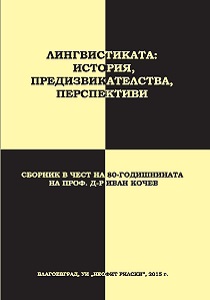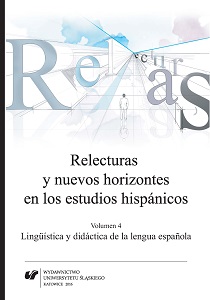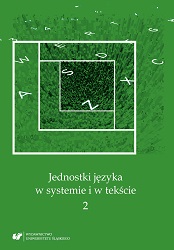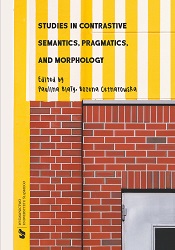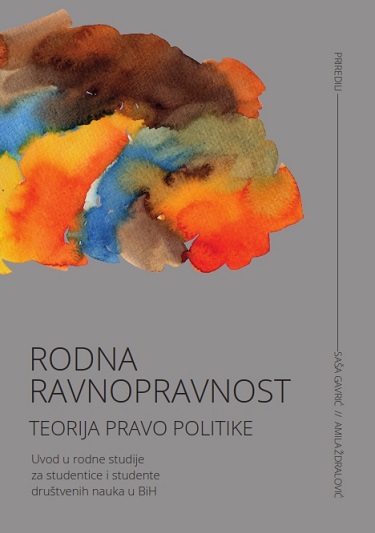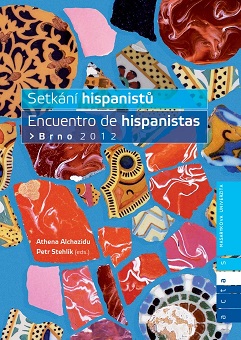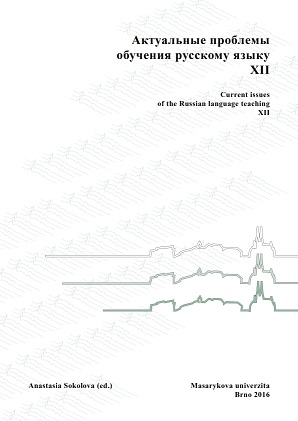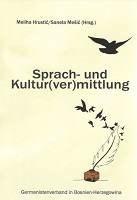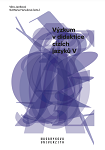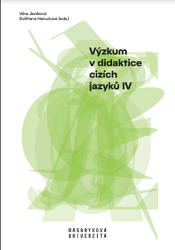Author(s): / Language(s): German
Der Germanistenverband in Bosnien-Herzegowina veranstaltete in Zusammenarbeit mit der Philosophischen Fakultät der Universität Tuzla vom 16. bis zum 18. September 2021 an der Philosophischen Fakultät der Universität Tuzla die 3. Germanistenkonferenz. Das Thema der Konferenz war „Sprach- und Kultur(ver)mittlung“. An dieser Konferenz haben 30 Vortragende aus Bosnien-Herzegowina, Deutschland, Italien, Kroatien, Rumänien und Tschechien teilgenommen. Der vorliegende Sammelband beinhaltet 17 Artikel (acht originelle wissenschaftliche Arbeiten, eine vorläufige Mitteilung, sieben wissenschaftliche Übersichtsartikel und einen Fachartikel). Manche der Beiträge entstanden im Rahmen nationaler und internationaler Projekte, manche sind das Ergebnis langjähriger Arbeit an Promotionsprojekten, andere entstanden in kürzerer Zeit und wurden vor allem durch unseren Call for paper inspiriert. Die Beiträge wurden im Sammelband nach den Forschungsfeldern (Sprachwissenschaft, Übersetzungswissenschaft, Literaturwissenschaft, Fremdsprachendidaktik, Literaturdidaktik) und alphabethisch nach den Namen der AutorInnen angeordnet. Zunächst folgen Informationen zu den acht Beiträgen im Rahmen der Sektion Sprachwissenschaft: Der erste Beitrag entstand im Rahmen des Mehrphasenprojektes Bosnisch-Deutsches Universalwörterbuch, das an der Abteilung für Germanistik der Philosophischen Fakultät der Universität Sarajevo seit 2018 durchgeführt wird. Alma Čović-Filipović beschäftigt sich in diesem Beitrag zum Thema Lexikalischer Anisomorphismus im Sprachenpaar Bosnisch-Deutsch und Strategien der lexikografischen Vermittlung mit den lexikalisch-semantischen Beziehungen zwischen sprachlichen Einheiten des Bosnischen und Deutschen. Der Beitrag von Adriana Dănilă zum Thema Vermittlung von fachlichen Inhalten in einigen journalistischen Texten aus der „ADZ für Rumänien“, welcher ein Teil des GIP-Forschungsprojektes Coronavirus Debatte in der rumäniendeutschen Presse des IDF Heidelberg und fünf rumänischer Partneruniversitäten ist, beschäftigt sich mit sprachlichen Ausdrucksformen, die zur Vermittlung von Fachwissen dienen. Minka Džanko schreibt in ihrem gesprächsanalytischen Beitrag zum Thema ICH WEIß NICHT und NE ZNAM: Über direkte Vermittlung von Nicht-Wissen hinaus über den Gebrauch der im Titel genannten Phrasen in Arzt-Patienen-Gesprächen und vergleicht anhand der Analyse eines umfangreichen Korpus diesen Gebrauch bei deutschen und bosnischen PatientInnen. Alma Halidović und Zerina Brkić interpretieren in ihrem Beitrag mit dem Titel Pragmatische Aspekte des Schweigens. Analyse am Beispiel des Romans „Ehre“ von Elif Shafak die unterschiedlichen Funktionen des Schweigens in einem literarischen Werk. In ihrem Beitrag zum Thema Verwendung von lexikalisierten Diminutiven bei Körperteilbezeichnungen im Deutschen und im Bosnischen nimmt Meliha Hrustić die Körperteilbezeichnungen mit diminutiven Suffixen unter die Lupe und vergleicht den Bestand solcher Wörter in beiden genannten Sprachen. Im Beitrag Werbeanzeigen aus den Osijeker deutschsprachigen Zeitungen „Die Drau“ und „Slavonische Presse“ als Sprach- und Kultur(ver)mittler im späten 19. und frühen 20. Jahrhundert von Ivana Jozić und Ivana Šarić Šokčević bekommt der Leser einen wissenschaftlichen Einblick in die Werbeanzeigen aus einer anderen Zeit. Dieser Beitrag entstand im Rahmen des Projektes Spurensuche: Deutsche Sprache, Literatur und Kultur in Kroatien, welches wiederum im Rahmen der GIP zwischen dem Institut für Germanistik der Universität Gießen und der Abteilung für deutsche Sprache und Literatur der Fakultät für Sozial- und Geisteswissenschaften der Universität Osijek entstanden ist und vom DAAD finanziell unterstützt wird. Zineta Lagumdžija schreibt in ihrem Artikel Textsortenabhängigkeit sprachlicher Strukturen am Beispiel der Konstruktion [sich lassen + Infinitiv] in der politischen Berichterstattung in deutschen Tageszeitungen, einer pragmatisch- und kommunikationsorientierten Untersuchung, über die informative und appelative Funktion der im Titel genannten Konstruktion. Diana Ristivojević, Doktorandin an der Universität Tuzla, behandelt in ihrem Beitrag Darstellung der Partikelkombinationen in ihrer Abfolge am Beispiel der Modalpartikel „schon“ auf der Basis einer theoretischen Grundlage die Abfolge der Modalpartikelkombinationen mit der Modalpartikel schon in der heutigen Standardsprache. Zwei Beiträge enstanden in der Sektion Übersetzungswissenschaft. Im ersten Artikel mit dem Titel Hotspots und Hotwords in den ins Deutsche übersetzten Erzählungen über Mostar von Hamza Humo analysiert Sanela Mešić die in den Erzählungen vorkommenden Hotspots und Hotwords und ihre Übersetzungen ins Deutsche. Es handelt sich, wie bei vielen anderen Beiträgen auch, um einen interdisziplinären Beitrag, der sich mit interkultureller Pragmatik, mit der Übersetzungswissenschaft und der Linguokulturologie beschäftigt. Im Rahmen eines Untertitelungsprojektes mit studentischer Beteiligung an der Universität Banja Luka entstand der Beitrag Un(über)setzbarkeit von Vulgarismen ins Deutsche am Beispiel der Untertitlung der heimischen Serie „Kosti“ von Melsada Zec Zejnić und Ivana Četić. Die beiden AutorInnen behandeln Schimpfwörter und Flüche im Serbischen und ihre Entsprechungen im Deutschen. Aus dem Bereich der Literaturwissenschaft können drei Beiträge vorgestellt werden. Christina Arendt stellt in ihrem Artikel zum Thema Aktuelle Fiktionalisierungsformen der juristischen Aufarbeitung nationalsozialistischer Verbrechen am Beispiel von „Der Fall Collini“ von Ferdinand von Schirach (2011) und „Deutsches Haus“ von Annette Hess (2018) „zwei literarische Fiktionalisierungsformen der juristischen Aufarbeitung nationalsozialistischer Verbrechen“ vor, welche im letzten Jahrzehnt publiziert wurden. Ivica Petrović gewährt uns in seinem Beitrag Die Gegend um Tuzla in deutschsprachigen Reiseberichten einen Einblick in die Kultur in der Gegend um Tuzla, wie sie in literarischen Werken dargestellt wird. Jasmina Zlatarević schreibt in ihrem Artikel Zur literarischen Rekonstruktion des Opferbegriffes im Roman „Schindlers Lift“ von Darko Cvijetić über ein sehr aktuelles Werk, welches auch ins Deutsche übersetzt wurde. In der Sektion Fremdsprachendidaktik sind drei Beiträge entstanden. Im ersten mit dem Titel Zum Stellenwert von Sprach- und Kulturmittlung im Fremdsprachenunterricht: Mit Beispielen aus aktuellen DaF-Lehrwerken gibt die Autorin Lara Hedžić einen sehr detaillierten theoretischen Überblick zum Thema Sprachmittlung in der Fremdsprachendidaktik und analysiert dann ein paar bosnische und deutsche DaF-Lehrwerke im Hinblick auf die Sprachmittlungsaufgaben. Der Beitrag von Petr Pytlík zum Thema Fremdsprachendidaktisches Potential von authentischen Texten im DaF/DaZ-Unterricht – ein Unterrichtsentwurf für A2-Niveau entstand im Rahmen des Projektes eines methodischen Online-Portals an der Pädagogischen Fakultät der Masaryk-Universität in Brno. Der Autor möchte zeigen, dass authentische Texte auch für Lernende mit einem niedrigeren Sprachniveau geeignet sind. Ivica Tokić beschäftigt sich in seinem Artikel zum Thema Phraseologismen im DaF-Unterricht mit der Phraseodidaktik, mit den Methoden und einzelnen Schritten, die man berücksichtigen sollte, wenn man im DaF-Unterricht Phraseologismen behandelt. Der letze Beitrag in diesem Sammelband ist in der Literaturdidaktik anzusiedeln. Die Autorin Marijana Jeleč zeigt mit ihrem Beitrag Kinderliteratur als Medium für interkulturelles Lernen am Beispiel von Uticha Marmons „Mein Freund Salim“ und Peter Härtlings „Djadi, Flüchtlingsjunge“, wie Literatur das interkulturelle Lernen bei Kindern fördern kann. Die meisten Beiträge behandeln, wie auch an den Titeln zu erkennen ist, auf die eine oder andere Art und Weise das Thema Sprach- und Kultur(ver)mittlung, aber wir haben in den Sammelband auch andere interessante Beiträge aufgenommen, die sich mit anderen germanistischen Themen befassen. Alle Artikel unterlagen einem doppelt-blinden Begutachtungsverfahren, bei welchem sie auch kategorisiert wurden. Unser aufrichtiger Dank gilt allen AutorInnen für die interessanten Vorträge und noch interessanteren Beiträge für den Sammelband, aber ebenso den GutachterInnen aus Deutschland, Italien, dem Kosovo, Kroatien, Nordmazedonien, Österreich, Polen, Serbien, Slowenien, Spanien, Tschechien und der Türkei, die sehr detaillierte und konstruktive Verbesserungsvorschläge gemacht haben. Um ihre Anonymität wahren zu können, unterlassen wir es, ihre Namen zu nennen, aber wir hoffen, dass wir sie für die Teilnahme an den kommenden Konferenzen des Germanistenverbandes in Bosnien-Herzegowina begeistern können. Wir bedanken uns ganz herzlich bei der Philosophischen Fakultät Tuzla, die uns ihre Räumlichkeiten zur Verfügung gestellt hat; beim Goethe-Institut Sarajevo für die Einladung der Plenarvortragenden; beim Österreich Institut Sarajevo für die Unterstützung; bei dem ganzen Organisationsteam und dem Herausgeberbeirat; bei dem Föderalen Ministerium für Bildung und Wissenschaft für die finanzielle Unterstützung; bei dem DAAD-Lektor an der Universität Sarajevo, Martin Schönemann, dessen Verbesserungsvorschläge und Hinweise zur Qualität des Sammelbandes beigetragen haben; und bei allen anderen, die zum Erfolg der Konferenz und zur Veröffentlichung dieses Sammelbandes ihren Beitrag geleistet haben.
More...
